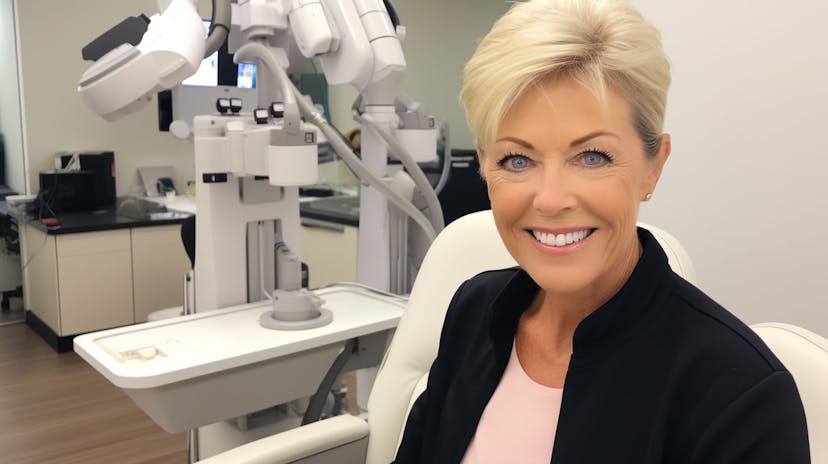
Age can significantly impact vision, and the changes are often a natural part of the ageing process. One of the most common age-related vision issues is presbyopia, which typically becomes noticeable in the 40s. Presbyopia is the gradual loss of the eye's ability to focus on nearby objects, making activities like reading or working on a computer more challenging. Additionally, the lens of the eye tends to become less flexible over time, making it harder to adjust to different distances.
What Age Can You Get Laser Eye Surgery In The UK?
In the UK, the minimum age for laser eye surgery is typically 18 years old. This is because your vision needs to be stable before undergoing the procedure, and most people's eyes continue to change throughout adolescence.
For an 18-year-old, laser eye surgery can offer several compelling benefits. It provides freedom from the daily hassle of glasses or contact lenses, which can be particularly valuable for those active in sports or social activities. Clear vision can also support career or educational aspirations, especially in fields like aviation or military service, where excellent eyesight is crucial. If their prescription has stabilised, which often happens by this age, the surgery can be a long-term investment in vision correction, potentially saving money on eyewear over time.
When Can You Get Laser Eye Surgery?
You can get laser eye surgery in the UK once your vision has stabilised and your prescription has been consistent for at least one to two years. This stability is crucial to ensure the best long-term results. Additionally, candidates should have healthy eyes, free from conditions like severe dry eye, keratoconus, or cataracts. The ideal timing for the surgery also depends on your overall eye health and specific vision needs, which will be assessed during a thorough consultation with a qualified ophthalmologist. This consultation will help determine if and when you are a suitable candidate for the procedure.
Is There An Eye Laser Surgery Age Limit
While there isn't a strict age limit for eye laser surgery, certain age-related factors influence eligibility. Typically, the minimum age for undergoing laser eye surgery is 18, as younger individuals may still experience changes in their vision. For instance, a 22-year-old whose vision prescription has stabilised for at least a year might be a suitable candidate, whereas an individual in their 60s may need a thorough evaluation due to potential age-related changes in the eyes, such as presbyopia or cataracts.
Taking The First Step To Visual Freedom
Maintaining good vision throughout life involves adopting proactive measures to prevent eye issues. A crucial step is scheduling regular eye examinations with an optometrist to detect any potential problems early on. Eating a balanced diet rich in vitamins and minerals, including colourful vegetables particularly those beneficial for eye health like vitamins A, C, and E, can contribute to maintaining optimal vision. Protecting the eyes from harmful UV rays by wearing sunglasses outdoors and reducing screen time can also play a role in preventing eye strain and fatigue. Staying hydrated is essential for overall health, including eye health, as dehydration can impact the tear film and lead to dry eyes.
For those considering vision correction, advancements in technology have opened up a range of options. Laser eye surgery, such as LASIK (Laser-Assisted In Situ Keratomileusis), offers a precise and effective means to correct refractive errors like nearsightedness, farsightedness, and astigmatism. Additionally, innovative procedures such as SMILE (Small Incision Lenticule Extraction) have emerged, providing patients with minimally invasive options for vision correction. These technological advancements, coupled with personalised treatment plans, allow individuals to explore tailored solutions to improve and maintain their vision. Consulting with an eye care professional can help individuals make informed decisions about the latest technologies available for their specific needs.
What's The Best Laser Technology For My Age?
When considering vision correction technologies, it's essential to tailor the choice to an individual's age, ensuring that the selected method aligns with existing eye health and specific visual needs and the natural changes that occur with ageing.

ReLex Smile Laser Eye Technology (22+)
RELEX Smile Laser Eye Technology, a cutting-edge advancement in vision correction, is most commonly recommended for individuals in their early 20s and beyond. This age range is generally considered ideal because, by the early 20s, the eyes have typically stabilised in terms of prescription, providing a more predictable foundation for the laser correction procedure. RELEX Smile is particularly well-suited for those experiencing myopia (nearsightedness) and astigmatism, offering a minimally invasive alternative to traditional laser procedures.
Moreover, while RELEX Smile is effective for a wide age range, individual candidacy may vary based on factors such as the overall health of the eyes and specific refractive errors. Consulting with an experienced eye care professional is crucial to determine if RELEX Smile is the most suitable option, taking into account an individual's unique eye characteristics, lifestyle, and visual needs. The technology aims to provide long-lasting vision correction, and the decision to undergo the procedure should be made collaboratively between the patient and their eye care specialist based on a thorough assessment of various factors.
Presbyond Laser Eye Technology (40+)
Presbyond Laser Eye Technology is primarily designed to address presbyopia, a common age-related vision issue that becomes noticeable typically after the age of 40. This innovative technology is particularly beneficial for individuals in their mid-40s and older who are experiencing difficulty with close-up vision due to the natural ageing process of the eye. Presbyond utilises advanced laser techniques to adjust the cornea, allowing for improved near and intermediate vision, and reducing the reliance on reading glasses or bifocals.
Choosing the optimal age for Presbyond Laser Eye Technology involves considering the specific visual needs and lifestyle of the individual. While it is generally recommended for those experiencing presbyopia, a thorough consultation with an eye care professional is crucial to determine candidacy. Factors such as overall eye health, the stability of refractive errors, and the presence of other eye conditions will be assessed to ensure that Presbyond is the most suitable and effective solution for achieving clear and balanced vision at varying distances.
Everyone eventually becomes presbyopic - Long-sighted people tend to notice it earlier than short-sighted people. This typically triggers the first visit to the optometrist for blurred reading vision.

Lasik Laser Eye Technology (20 - 40)
LASIK (Laser-Assisted In Situ Keratomileusis) is a widely utilised laser eye surgery for correcting refractive errors like myopia (nearsightedness), hyperopia (farsightedness), and astigmatism. The ideal age range for LASIK is typically between 20 and 40 years old. This is because, during this period, the eyes tend to have stabilised in terms of prescription, providing a more predictable outcome post-surgery. LASIK is a quick and efficient procedure that reshapes the cornea, allowing light to be properly focused onto the retina, thereby improving vision without the need for glasses or contact lenses.
The process begins with the creation of a thin flap on the cornea, the clear front part of the eye. This flap is gently lifted to expose the underlying corneal tissue. A highly specialised excimer laser is then used to reshape the cornea by removing microscopic amounts of tissue. For nearsightedness, the cornea is flattened, while for farsightedness, it is steepened. Astigmatism is addressed by smoothing out irregularities in the cornea. LASIK is known for its quick recovery time, with many patients experiencing significantly improved vision within a day or two after the procedure.
LASEK Laser Eye Technology (25+)
LASEK is a laser eye surgery similar to LASIK but involves a slightly different surgical technique. LASEK is often considered for individuals who may not be suitable candidates for LASIK due to thinner corneas. The best age for LASEK can vary, but it is generally recommended for individuals in their mid-20s and older when their prescription has stabilised. LASEK can be effective in treating myopia (nearsightedness), hyperopia (farsightedness), and astigmatism. A thorough assessment by an eye care professional is essential to determine if LASEK is the most suitable option based on an individual's specific eye health and refractive error.
Moreover, during the Lasek procedure, the surgeon first applies a diluted alcohol solution to loosen and temporarily move aside a thin layer of the cornea's protective epithelium. This step allows access to the underlying corneal tissue. Subsequently, an excimer laser precisely sculpts the cornea to reshape its curvature, thereby correcting the refractive error. Once the corneal reshaping is complete, the surgeon repositions the epithelial flap, acting as a natural bandage. Unlike LASIK, which involves creating a corneal flap, LASEK preserves more corneal tissue, making it a suitable option for individuals with thinner corneas.
PRK Laser Eye Technology (25+)
Photorefractive Keratectomy (PRK) is a laser eye surgery technology that predates LASIK and is typically recommended for individuals whose corneas may be too thin or unsuitable for the creation of a corneal flap, a step involved in LASIK. The best age for PRK can vary, but it is generally considered suitable for individuals in their mid-20s and beyond. This age range is preferred because it allows the eyes to stabilise in terms of prescription, providing a more predictable outcome after surgery. PRK is effective in addressing common refractive errors such as myopia (nearsightedness), hyperopia (farsightedness), and astigmatism by using an excimer laser to precisely reshape the cornea.
As with other laser eye surgeries, individual candidacy for PRK depends on various factors, including overall eye health, corneal thickness, and specific refractive errors. Consulting with an experienced eye care professional is crucial to determine if PRK is the most suitable option based on an individual's unique eye characteristics, ensuring a safe and effective means of achieving clear vision without the need for glasses or contact lenses.
PTK Laser Eye Technology (18+)
Phototherapeutic Keratectomy (PTK) is a specialised laser eye surgery technique primarily employed to treat various corneal disorders rather than correct refractive errors. Unlike refractive surgeries such as LASIK or PRK, PTK is not geared towards improving vision in the conventional sense. Instead, it targets conditions like recurrent corneal erosion, corneal dystrophies, scars, or irregularities that affect the clarity and health of the cornea. Therefore, determining the best age for PTK is contingent on the presence of these specific corneal disorders rather than an individual's age.
The decision to use PTK is typically guided by the nature and severity of the corneal condition, and the procedure is often considered when other treatments may be insufficient. Eye care professionals, particularly corneal specialists or ophthalmologists, assess each case individually, weighing factors such as the stability of the corneal disorder. As PTK is not driven by age-related considerations, it remains a valuable option for those requiring precise corneal tissue removal or reshaping to address specific pathological conditions.

Age Comparison Table
| Technology | Age Group | Pros | Cons |
|---|---|---|---|
| ReLex Smile | 25+ | - Minimally invasive\n- Quick recovery | - Limited availability\n- Potential for dry eyes |
| Presbyond | 40+ | - Addresses presbyopia\n- High precision | - Limited to presbyopia\n- May require adjustments |
| Lasik | 20-40 | - Rapid results\n- Low discomfort | - Flap-related complications\n- Not suitable for everyone |
| LASEK | 25+ | - Suitable for thin corneas\n- Reduced risk of dry eyes | - Longer recovery\n- Discomfort during healing |
| PRK | 25+ | - No flap creation\n- Suitable for thin corneas | - Longer recovery\n- Potential for haze |
| PTK | 18+ | - Treats corneal disorders\n- Precise tissue removal | - May require multiple sessions\n- Potential for scarring |
The Final Step To Visual Freedom
Experience the transformative power of cutting-edge laser eye surgery at My-iClinic, where precision meets personalised care. Our expert team, including renowned corneal specialists, is dedicated to providing the most advanced vision correction technologies tailored to your unique needs. Whether you're in your mid-20s exploring options like LASIK, or seeking solutions for age-related presbyopia with innovative technologies like Presbyond, we've got you covered. Embrace clear vision at any age with our state-of-the-art procedures, including RELEX Smile, LASEK, PRK, PTK, and more. Your journey to optimal eye health starts here – schedule your consultation today and discover a world of visual possibilities with My-iClinic!
Find out more by Speaking to our team









